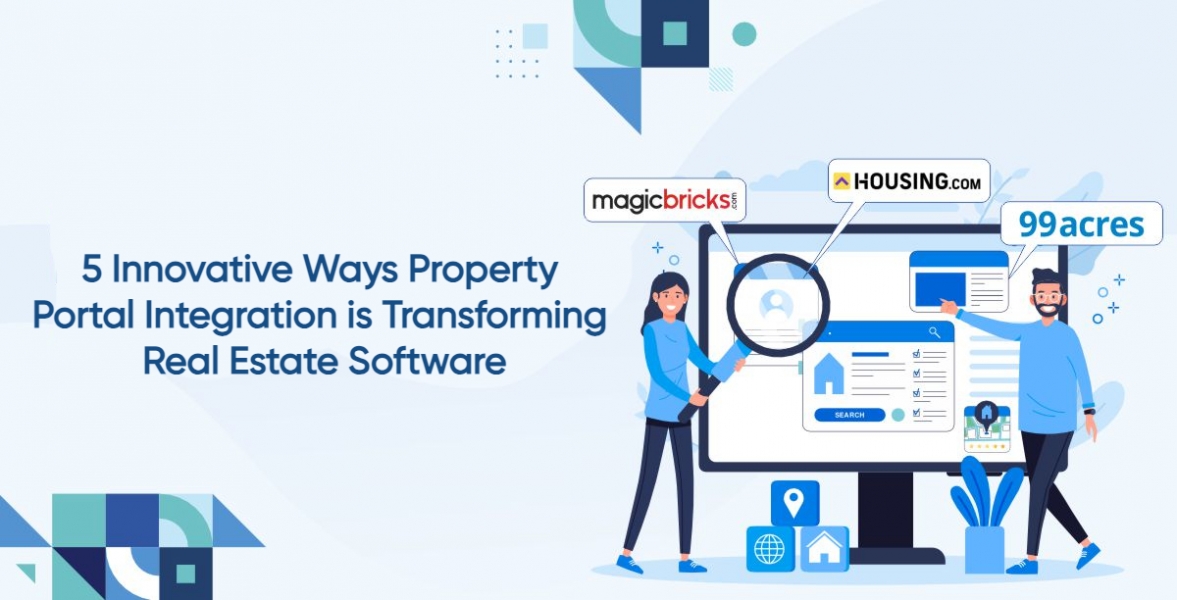- sales@itaakashsoftware.com
- DSK Rohit, office No-13, 3rd Floor, 1264/2 Apte Road, Deccan Gymkhana, Shivajinagar, Pune - 411 004. Maharashtra, INDIA
5 Innovative Ways Property Portal Integration is Transforming Real Estate Software
- Home
- Blog Details
5 Innovative Ways Property Portal Integration is Transforming Real Estate Software
A key element in the success of any real estate business is effectively acquiring, managing, and nurturing quality leads. Handling these tasks manually can be tedious and frequently leads to inefficiencies. However, by automating real estate processes, various aspects of the business become more streamlined and efficient.
Real estate software integrated with property portals streamlines CRM tasks, enhancing productivity, fostering collaboration, and boosting revenue. The workflows that can be streamlined, include:
Sales and Pre-Sales
Customer support
Project engineering
Site management
Purchase and budget
HR and payroll
Contractors and suppliers
Asset management
Why You Should Integrate Property Portals into Your Real Estate Software
Integrating property portals with your real estate software offers significant advantages, particularly in lead generation. Potential buyers often browse property listings on various websites, making these portals a crucial source for capturing leads directly into your software.
Without this integration, companies using an Enterprise Resource Planning (ERP) system miss out on maximizing its potential. When potential buyers leave their details on a property portal, this information can be instantly accessed through an integrated Real Estate ERP system.
By incorporating multiple property portals, your system can aggregate lead information from diverse sources into a unified platform. This simplifies the process for real estate organizations to manage, track, and engage with potential buyers effectively.
Property Portals Integration for Maximum Lead Conversions
Choosing a fundamental real estate ERP or CRM system can significantly streamline site activities, project engineering, and sales and pre-sales tasks. By integrating property portals, you can enhance your lead management capabilities, attracting higher-quality leads and offering tools to nurture them more efficiently.
Integrating property portals can boost lead conversions in various ways. Here are the top five ways this integration will revolutionize real estate software.
1. Unified Lead Management on One Comprehensive Platform
The primary advantage of integration for real estate companies is the immediate access to leads generated by property listing websites. The Real Estate CRM software pulls data directly from portals, and other sources for the user to access it on one cloud-based system.
With a unified source of truth, the entire organization can view and update the same information. This ensures that all stakeholders have access to consistent data at any given time, eliminating confusion caused by duplicate entries, outdated information, disparate systems, or delays due to paper-based processes.
2. Enhanced communication and collaboration
A real estate software system not only captures leads from various sources but also effectively organizes and manages them. With CRM dashboards, all employees can view the entire lead flow, making it easy to visualize the sales funnel. This ensures that the sales and marketing teams are aligned in their revenue-generating efforts, keeping everyone in the organization on the same page.
As different team members use the real estate ERP system, they can see detailed records of their leads and decide on the next steps. Once leads are captured from property portals, the nurturing phase starts. Throughout this process, from initial contact to site visits, team members can log notes and record calls within the system. These entries and recordings are accessible to other team members, allowing for a personalized approach in future interactions.
The platform additionally enables users to schedule automated reminders for follow-ups and site visits, ensuring no meetings are overlooked and facilitating timely engagement with prospects armed with pertinent information.
3. Track customer journey metrics and progress
With CRM dashboards accessible via both web-based systems and mobile apps, sales and marketing teams gain real-time insights into the status of prospects within the sales pipeline. They can track the number of missed and pending opportunities, as well as monitor booked and completed site visits. Automated lead distribution ensures timely follow-ups by distributing leads to team members automatically.
Automating lead management significantly reduces time and effort, enabling teams to concentrate on nurturing prospects for higher conversion rates. By leveraging property portal integration, the pre-sales team can effortlessly monitor the flow of leads, enhancing their ability to gauge the effectiveness of their sales efforts without the need for manual organization.
4. View system-generated AI-powered reports
Integrating Artificial Intelligence into software unquestionably enhances the capabilities of industry professionals. Within a Real Estate System, AI integration equips organizations with tools for gaining valuable insights without the need for extensive manual data analysis.
AI and Machine Learning facilitate the development of intelligent CRM software, enabling businesses to make informed decisions that yield optimal results. Predictive analytics generated by AI offer real estate enterprises insights into metrics like site visits, unit bookings, collections, and customer referrals, enhancing strategic planning with enhanced accuracy and reduced risk.
5. Harnessing Real Estate Leads Anytime, Anywhere through Cloud Integration
The adoption of cloud computing has reshaped real estate management, emerging as the preferred ERP solution for industry experts. It facilitates the development and deployment of web and mobile applications aimed at optimizing lead management in real estate.
Centralizing data from property portals within a cloud-based CRM system offers enhanced efficiency, speed, affordability, security, instant accessibility, and scalability. This enables remote workers, sales teams, on-site personnel, vendors, and all stakeholders to seamlessly access the system from smartphones, laptops, tablets, or computers, regardless of location.
The flexibility and scalability afforded by cloud ERP systems in nurturing property leads are pivotal reasons driving professionals to invest in integrated real estate software. By integrating with third-party applications and devices, organizations bolster their management capabilities, gaining a competitive edge in a rapidly evolving market. Beyond property portals, integrations span advertising, customer service, IoT, GPS tracking, GIS management, mobile ERP applications, chatbots, and more.



Write A Comment